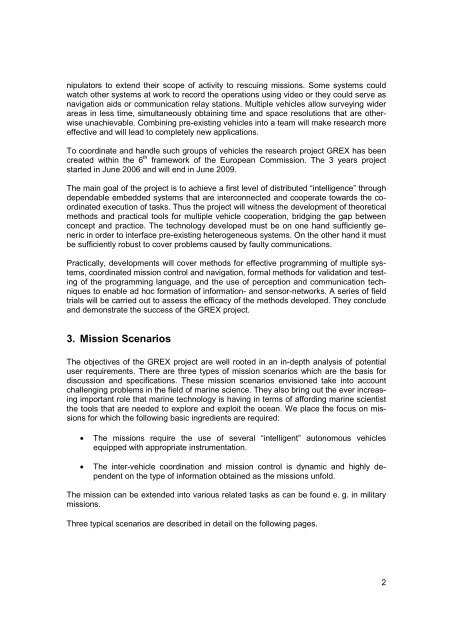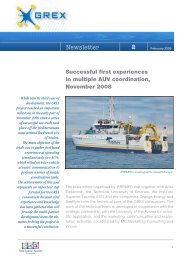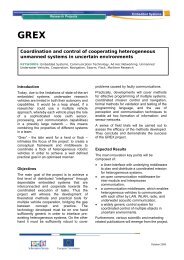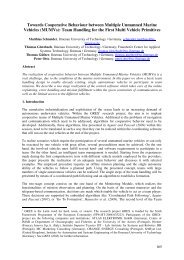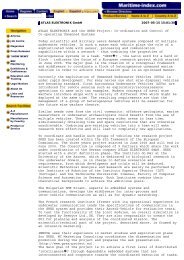The European Project GREX: Coordination and Control of ...
The European Project GREX: Coordination and Control of ...
The European Project GREX: Coordination and Control of ...
Create successful ePaper yourself
Turn your PDF publications into a flip-book with our unique Google optimized e-Paper software.
nipulators to extend their scope <strong>of</strong> activity to rescuing missions. Some systems could<br />
watch other systems at work to record the operations using video or they could serve as<br />
navigation aids or communication relay stations. Multiple vehicles allow surveying wider<br />
areas in less time, simultaneously obtaining time <strong>and</strong> space resolutions that are otherwise<br />
unachievable. Combining pre-existing vehicles into a team will make research more<br />
effective <strong>and</strong> will lead to completely new applications.<br />
To coordinate <strong>and</strong> h<strong>and</strong>le such groups <strong>of</strong> vehicles the research project <strong>GREX</strong> has been<br />
created within the 6 th framework <strong>of</strong> the <strong>European</strong> Commission. <strong>The</strong> 3 years project<br />
started in June 2006 <strong>and</strong> will end in June 2009.<br />
<strong>The</strong> main goal <strong>of</strong> the project is to achieve a first level <strong>of</strong> distributed “intelligence” through<br />
dependable embedded systems that are interconnected <strong>and</strong> cooperate towards the coordinated<br />
execution <strong>of</strong> tasks. Thus the project will witness the development <strong>of</strong> theoretical<br />
methods <strong>and</strong> practical tools for multiple vehicle cooperation, bridging the gap between<br />
concept <strong>and</strong> practice. <strong>The</strong> technology developed must be on one h<strong>and</strong> sufficiently generic<br />
in order to interface pre-existing heterogeneous systems. On the other h<strong>and</strong> it must<br />
be sufficiently robust to cover problems caused by faulty communications.<br />
Practically, developments will cover methods for effective programming <strong>of</strong> multiple systems,<br />
coordinated mission control <strong>and</strong> navigation, formal methods for validation <strong>and</strong> testing<br />
<strong>of</strong> the programming language, <strong>and</strong> the use <strong>of</strong> perception <strong>and</strong> communication techniques<br />
to enable ad hoc formation <strong>of</strong> information- <strong>and</strong> sensor-networks. A series <strong>of</strong> field<br />
trials will be carried out to assess the efficacy <strong>of</strong> the methods developed. <strong>The</strong>y conclude<br />
<strong>and</strong> demonstrate the success <strong>of</strong> the <strong>GREX</strong> project.<br />
3. Mission Scenarios<br />
<strong>The</strong> objectives <strong>of</strong> the <strong>GREX</strong> project are well rooted in an in-depth analysis <strong>of</strong> potential<br />
user requirements. <strong>The</strong>re are three types <strong>of</strong> mission scenarios which are the basis for<br />
discussion <strong>and</strong> specifications. <strong>The</strong>se mission scenarios envisioned take into account<br />
challenging problems in the field <strong>of</strong> marine science. <strong>The</strong>y also bring out the ever increasing<br />
important role that marine technology is having in terms <strong>of</strong> affording marine scientist<br />
the tools that are needed to explore <strong>and</strong> exploit the ocean. We place the focus on missions<br />
for which the following basic ingredients are required:<br />
• <strong>The</strong> missions require the use <strong>of</strong> several “intelligent” autonomous vehicles<br />
equipped with appropriate instrumentation.<br />
• <strong>The</strong> inter-vehicle coordination <strong>and</strong> mission control is dynamic <strong>and</strong> highly dependent<br />
on the type <strong>of</strong> information obtained as the missions unfold.<br />
<strong>The</strong> mission can be extended into various related tasks as can be found e. g. in military<br />
missions.<br />
Three typical scenarios are described in detail on the following pages.<br />
2


